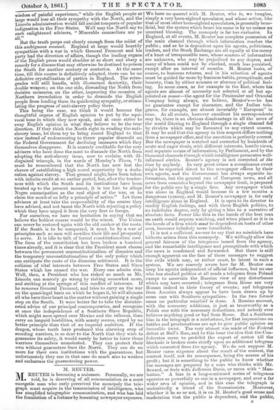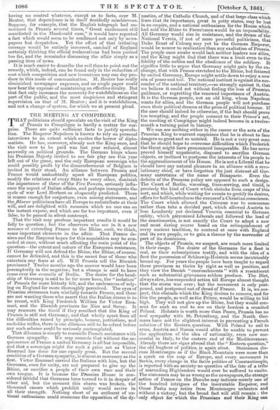M. REUTER.
MREUTER is becoming a nuisance. Personally, we are s told, he is deserving of all commendation as a most energetic man who early perceived the monopoly the tele- graph must acquire in the transmission of intelligence, who has simplified telegraphic communication, and who has laid the foundation of a fortune by lessening newspaper expenses. We have no quarrel with M. Reuter, who is, we imagine, simply a very keen-sighted speculator, and whose action, like that of most other keen-sighted speculators, is generally bene- ficial, but the system which bears his name is by no means an unmixed blessing. The monopoly is far too exclusive. In England, at all events, M. Reuter has complete possession of the main channel through which information reaches the public ; and as he is dependent upon his agents, politicians, traders, and the Stock Exchange are all equally at the mercy of a knot of irresponsible men, whose sources of information are unknown, who may be prejudiced to any degree, and many of whom could not be checked, much less punished, except after an interval of months. M. Reuter looks, of course, to business returns, and in his selection of agents must be guided far more by business habits, promptitude, and honesty, than by either acumen or absence of political feel- ing. In some cases, as for example in the East, where his agents are almost of necessity not selected at all but ap- pointed en masse—the agent for the Peninsular and Oriental Company being always, we believe, Reuter's—he has no guarantee except for character, and the Indian tele- grams, for example, are almost invariably " European" in tone. At all events, however excellent his correspondents may be, there is an obvious disadvantage in all the news of the world filtering to England through a single channel fed by rivulets which may be flavoured to any extent unseen. It may be said that the agency in this respect differs nothing from a newspaper office, and the assertion is perfectly correct. But the newspaper is watched and corrected by hundreds of acute and eager rivals, with different interests, hostile views, and separate means of information, by Parliament, and by the thousand channels through which intelligence permeates well- informed circles. Reuter's agency is not corrected at the time by anybody. In very great crises a conspicuous event might be reported direct to the newspaper offices by their own agents, and the Government has always separate in- formation, but the general run of European news, and all news from countries beyond the newspaper limit, is prepared for the public eye by a single firm. Any newspaper which was alone in England would become in a few months a dangerous tyranny, and M. Reuter's newspaper is for early intelligence alone in England. It is open to its director to modify English feelings, and with them English politics, to an indefinite degree, only by giving a bias to a narrative of absolute facts. Power like this in the hands of the best man on earth would require watching, and when placed as it is in the hands of a firm which must be dependent on hosts of other men, becomes infinitely more formidable. It is not a sufficient answer to say that no mischiefs have hitherto arisen from this monopoly. We willingly allow the general fairness of the telegrams issued from the agency, and the remarkable intelligence and promptitude with which the news is condensed and forwarded. But there is still enough apparent on the face of these messages to suggest the evils which may, or rather must, be latent in such a system. We are scarcely aware how far M. Reuter can keep his agents independent of official influence, but no one who has studied politics at all reads a telegram from Poland except to ascertain the Russian view of any disturbance which may have occurred ; telegrams from Rome are very Roman indeed in their theory of events ; and telegrams from America always appear to have been drawn up by some one with Southern sympathies. • In the two former cases no particular mischief is done. A Russian account, with the necessary additions, is just as trustworthy as a Polish one with the necessary deductions, and nobody ever believes anything good or bad from Rome. But a Southern bias in the telegraph is a misfortune, for first impressions on battles and proclamations are apt to give public opinion an incurable twist. The very utmost was made of the Federal defeat at Bull's Run, and to this hour the idea that the Con- federates mean to prohibit the export of cotton till the blockade is broken rests chiefly upon an additional telegram which emanated from the agency. We do not suppose M. Reuter cares sixpence about the result of the contest, the contest itself, not its consequence, being the source of his profit ; but it is something to the public to know whether the messages are prepared by a man who thinks with Mr. Seward, or feels with Jefferson Davis, or raves with " Man- hattan." A bias in a long-continued series of telegrams operates as powerfully as one in a newspaper, and over a far wider area of opinion, and in this case the telegraph is undoubtedly a friend of the Secessionists. Moreover, whether it be so or not, it is on M. Reuter's good sense and moderation that the public is dependent, and the public, having no control whatever, except as to facts, over M. Reuter, that dependence is in itself decidedly mischievous. Suppose, for example, that the English telegraph had an- nounced in Prussia several times, " Great excitement still manifested in the Macdonald case," it would have reported a fact which would seem to be confirmed not only by news- papers but despatches. Yet the effect of that irritating message would be entirely incorrect, one-half of England certainly thinking the official reclamations had been pushed too far, and the remainder discussing the affair simply as a passing item of news. It is much easier to describe the evil than to point out the remedy, which, indeed, can be found only in the reduction of cost which competition and new inventions may one day pro- duce in this mode of communication. M. Reuter has really diminished newspaper expenses, and no single paper could now bear the expense of maintaining an effective rivalry. But that fact only increases the necessity for watchfulness on the part of the public, and the most suspicious and stringent supervision on that of M. Reuter ; and it is watchfulness, and not a change of system, for• which we at present plead.































 Previous page
Previous page